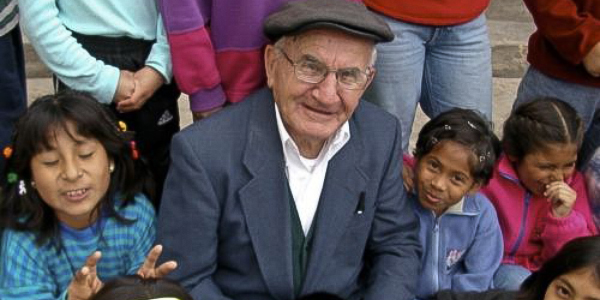Born in Grand Rapids, Michigan, in 1924, Joseph Walijewski always wanted to become a priest. Specifically he wanted to be a missionary, traveling to far off lands such as South America.
Walijewski’s mother also had high hopes for her son. In particular she had three wishes: “First, that she would have a son named Joseph who would become a priest; second, that he would build a church in honor of St. Joseph … and, third, that she would die on one of St. Joseph’s feast days.” Through God’s providence each of those wishes came true (his mother died on March 19).
However, it wasn’t very easy for Walijewski to realize the hopes of his mother. While he was able to begin seminary studies with the Franciscans at St. Bonaventure Seminary in Sturtevant, Wisconsin, they didn’t think he could ever become a priest. Walijewski couldn’t fulfill the language requirement and struggled with Latin, Greek and French. The Franciscans recommended that he remain a brother for the rest of his life.
Saddened by the rejection, Walijewski knew deep down that God was calling him to become a priest. Instead of remaining with the Franciscans he decided to enter the Polish seminary at Orchard Lake, Michigan, and successfully completed all of his studies.
Unfortunately his path to the priesthood was met with another obstacle. The Diocese of Grand Rapids wouldn’t allow him to move on to theological studies because he hadn’t studied at their own minor seminary.
Instead of being deterred Walijewski sent out letters to neighboring bishops in hopes that someone would accept him. Providentially, Bishop Alexander McGavick of the Diocese of La Crosse, Wisconsin, was looking for Polish-speaking priests to serve the numerous Polish immigrants within his diocese. Walijewski was accepted, finished his studies at St. Francis de Sales Seminary in Milwaukee, and was ordained on April 16, 1950.
A trailblazer in South America
At first Walijewski served at a few Polish communities in the diocese, but he didn’t forget his desire to be a missionary.
He asked Bishop John Patrick Treacy to be sent to South America and his request was finally answered. Walijewski’s assignment was to first be a missionary in Bolivia.
Upon arriving in the country, Walijewski was “[h]anded a machete by [the local bishop and] joined the bishop in hacking through the jungle until they found a fit place to build a church. ’Build a church here,’ Bishop Brown said … ’and the people will come and build their homes next to it.’” Walijewski did exactly that and founded the parish of the Holy Cross in Santa Cruz.
Walijewski was called back to the diocese after several years, but then returned later to South America to work in Peru. While there he built a church named after Saint Joseph and purchased five acres of land near the town of Lurin, Peru, for the purpose of building an orphanage.
Saint John Paul II visited El Salvador in 1985 and met Walijewski while he was there. John Paul II left $50,000 to the bishops to be used for their work with the poor in Peru and they all voted to give it to Walijewski. “Casa-Hogar Juan Pablo II” was built soon after and the orphanage took the “Boys Town” model as its framework.
Read more: How an Irish priest founded “Boys Town” in Omaha, Nebraska
Padre José, as he was affectionately called by all the children, stayed to work in Peru for the rest of his life. He was a simple priest full of passion and joy who loved children and working with the poor.
According to one description of him, “Squealing children would swarm around him, hugging his legs. His mouth twisted off to one side, giving him a Popeye the Sailor look, and his green eyes gleamed when he talked — especially when the topic was his kids.”
He died in Peru at age 82 from pneumonia in 2006.
Walijewski’s cause for canonization was initiated on May 1, 2013, by Bishop William Patrick Callahan of the Diocese of La Crosse, and continues to progress.
EWTN recently filmed a documentary on Father Walijewski titled A Pencil in Our Lord’s Hand, hearkening to a common phrase that he would use, as he often said that all he ever wanted to do was be “a pencil in our Lord’s hand.”

